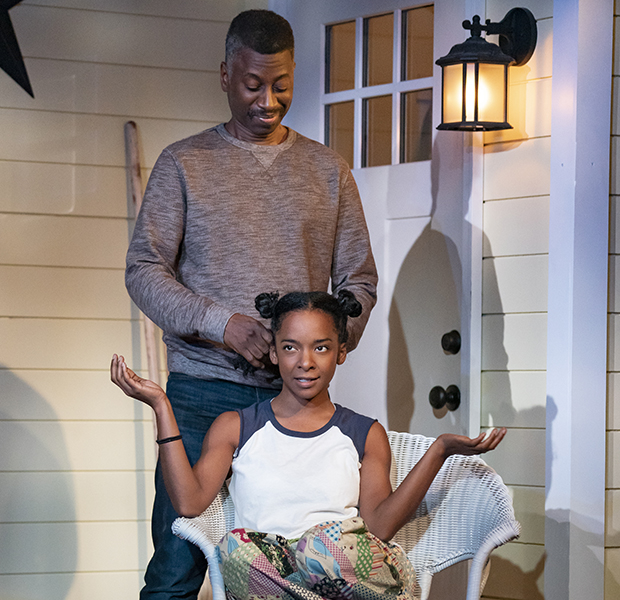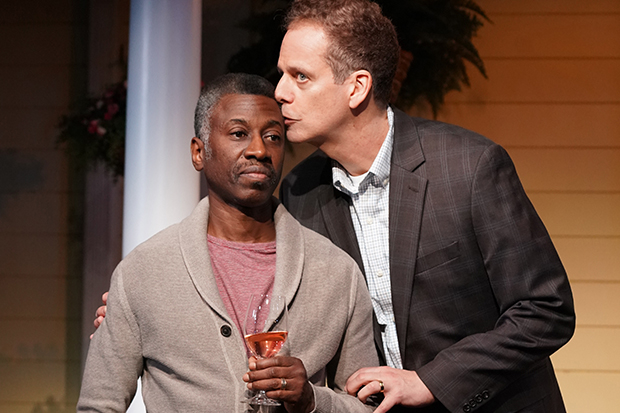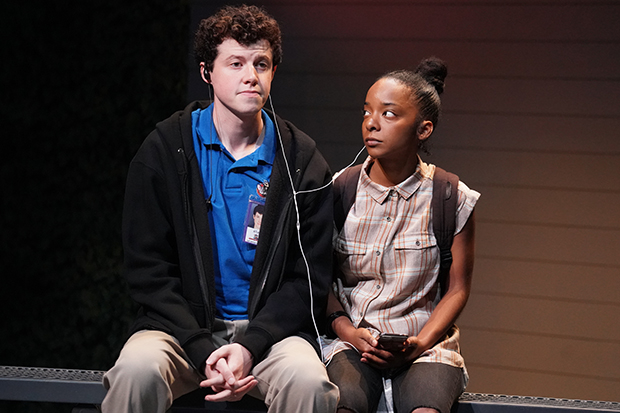The New Englanders Is Like a Donald Margulies Play With Gay and Black People
Two dads raise a rebellious daughter in New England in Jeff Augustin’s latest play.

(© Joan Marcus)
Jeff Augustin lays out his mission in the first few lines of his new play, The New Englanders, now making its world premiere with Manhattan Theatre Club at New York City Center. Aaron (Teagle F. Bougere) has just seen a movie with his daughter, Eisa (Kara Young), who was struck by the film's extended moments of contemplative silence. As he twists her hair, he remarks, "Yeah, white people love to watch other sad white people silently live their lives. They find it moving." But could black theatergoers be moved by stories about other sad black people? What about white theatergoers — would they still care? In its quirky, contrived, occasionally enjoyable way, The New Englanders tries to find out.
Aaron and Eisa are black, but Eisa's other dad (and Aaron's partner), Samuel (Patrick Breen), is white. Specifically, he's a white tech salesman, and his job regularly takes him away from their small New England town. When Samuel does return, he works overtime to manufacture special moments with his family. "After the movie, we shared a banana split at The Creamery," he tells Aaron about a father-daughter date night, "and sang Celine all the way home." None of this is true and Aaron knows it (although Breen convincingly marinates in his character's delusion). Eisa, an avid fan of "oldies" artists like Lauryn Hill, would never deign to belt out "The Power of Love."

(© Joan Marcus)
Eisa is smart, but like most teenagers, she's an extortionist (Young portrays her with the right mixture of menace and vulnerability). "You're racist," she flat-out accuses her ludicrously named white teacher Miss Charpie (Crystal Finn, magnificently harried). This is after Charpie gives her an F for shirking an assignment: a "vision board" mapping out her future. Eisa argues that it's limiting to ask teens to confine their dreams to foamcore, but her failure to do the assignment feels less like a principled stand than a symptom of senioritis (by the time the play begins, Eisa has already been accepted to NYU's Tisch School of the Arts). The incident's relationship to race is tenuous, at best.
In this story at least, Eisa's blackness is not the most important aspect of her identity — not nearly. She with the two gay dads, who was raised in suburban comfort, and who is about to attend the most expensive art school on the face of the earth, is far more a product of her class and its peculiar notions about happiness. While she is able to interrogate her lifestyle (and the way it was designed for whiter, straighter families than her own), that doesn't constitute a rejection of the incredible bounty into which she was born. What she labels "basic" is the kind of life that billions of people would give their left kidney to enjoy — and yet it seems to be making these characters miserable.
Tonally, The New Englanders has a lot more in common with the dreadful Dada Woof Papa Hot or any number of plays by Donald Margulies than with Augustin's last play in New York, the magical and messy Little Children Dream of God. In that respect, Augustin has succeeded in his goal of creating a play in which bourgeois black characters pursue lives of quiet desperation, just like their white counterparts. That doesn't make the genre any less cliché-ridden.

(© Joan Marcus)
When Eisa asks Aaron if he's happy, he responds, "Don't I seem happy?" before quaffing his glass of chardonnay (drinking wine on the porch becomes the ultimate sign of ennui). When Aaron's ex-boyfriend Raúl (Javier Muñoz with the unsettling smile of a salesman of false nostalgia) shows up, we know he's bad news because he drinks rosé out of season. Regrets are spoken aloud, and stupid choices are made in an effort to truly live. It's a fairly standard script, and Bougere plays it with midlife weariness lit by a flickering candle of adolescent romance. That is to say, he excels in a role that can be mastered by actors of any pigmentation, because it's not just white people who are inexplicably sad.
Perhaps in tribute to the movies he is referencing, Augustin has written a cinematic script, with short scenes in a wide variety of locations. Arnulfo Maldonado has designed a set that attempts to synthesize them all, but Saheem Ali's blocking is insufficiently specific in its treatment of these spaces, so we're often left wondering where we are (the polished wood floor on the front porch is particularly confusing). Alan C. Edwards's lighting and Palmer Hefferan's sound offers a few clues (when a car drives up, we know they are outside), but not enough to compensate for the lack of physical rigor in the direction. Fortunately, Ali does succeed in drawing emotionally truthful performances from the actors, and that is crucial to a story in which interior life is everything.

(© Joan Marcus)
None of Augustin's characters emerge from The New Englanders looking particularly good. The local weed dealer who works out of a Chuck E. Cheese turns out to be the most likable one in the bunch (funny, human performance by Adam Langdon). Were these stories always so tiresome? Do white audiences give them a pass because the characters look like them? Would they stop ingesting them if the characters were a different color — or would that merely convince audiences that the recycled story they are viewing is, in fact, new? As an experiment, The New Englanders usefully raises all of those questions. As a work of drama, it shows us nothing we haven't seen before.








